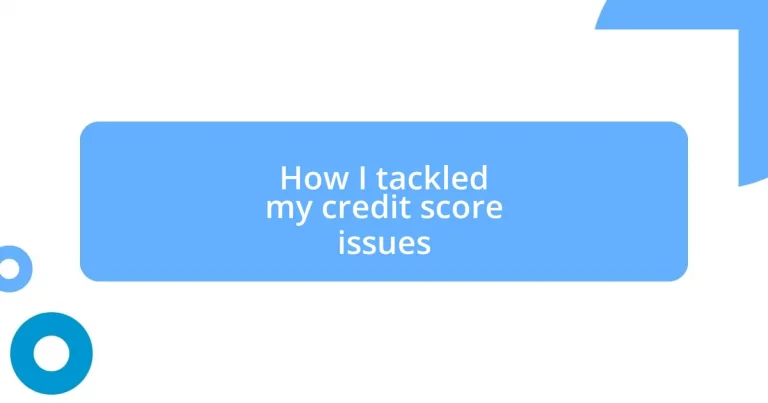Key takeaways:
- Understanding credit scores involves recognizing factors such as payment history and credit utilization that influence creditworthiness.
- Creating a structured credit repair plan with actionable steps and tracking progress is essential for improving one’s credit score.
- Utilizing tools like budgeting apps, payment reminders, and secured credit cards can significantly enhance financial habits and credit health.
- Celebrating milestones, such as achieving a desired credit score, fosters motivation and community support in maintaining financial well-being.
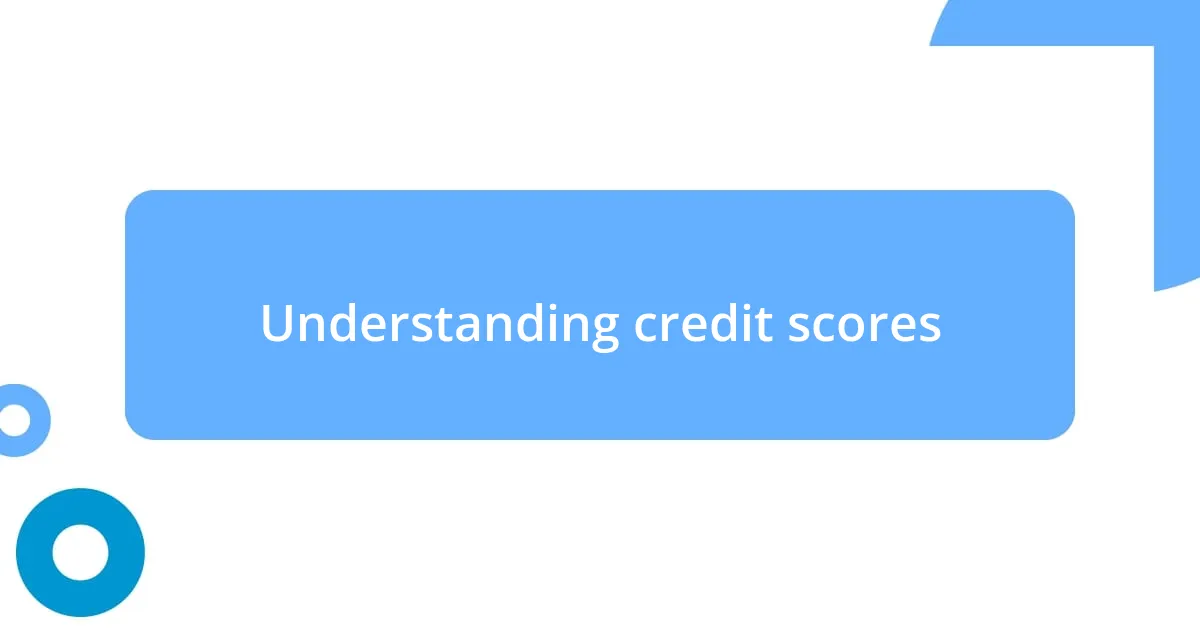
Understanding credit scores
Understanding credit scores can seem overwhelming at first, but I’ve found that breaking it down really helps. Your credit score is essentially a numerical representation of your creditworthiness, reflecting how likely you are to repay borrowed money. When I first learned this, I wondered, “How did my spending habits shape this number?”
As I delved deeper, I discovered that factors like payment history, amounts owed, and credit utilization play crucial roles in determining my score. I remember checking my report and feeling a mix of anxiety and curiosity as I observed the impact of my late payments. It was a wake-up call; I realized my actions directly influenced my financial future, making these concepts profoundly personal.
What I appreciate most is that credit scores aren’t static; they can be improved with the right strategies. Seeing my score gradually rise as I made better choices felt empowering. It made me ask myself, “What steps can I take today to further improve my credit journey?” Understanding this dynamic nature became a vital part of my financial literacy.
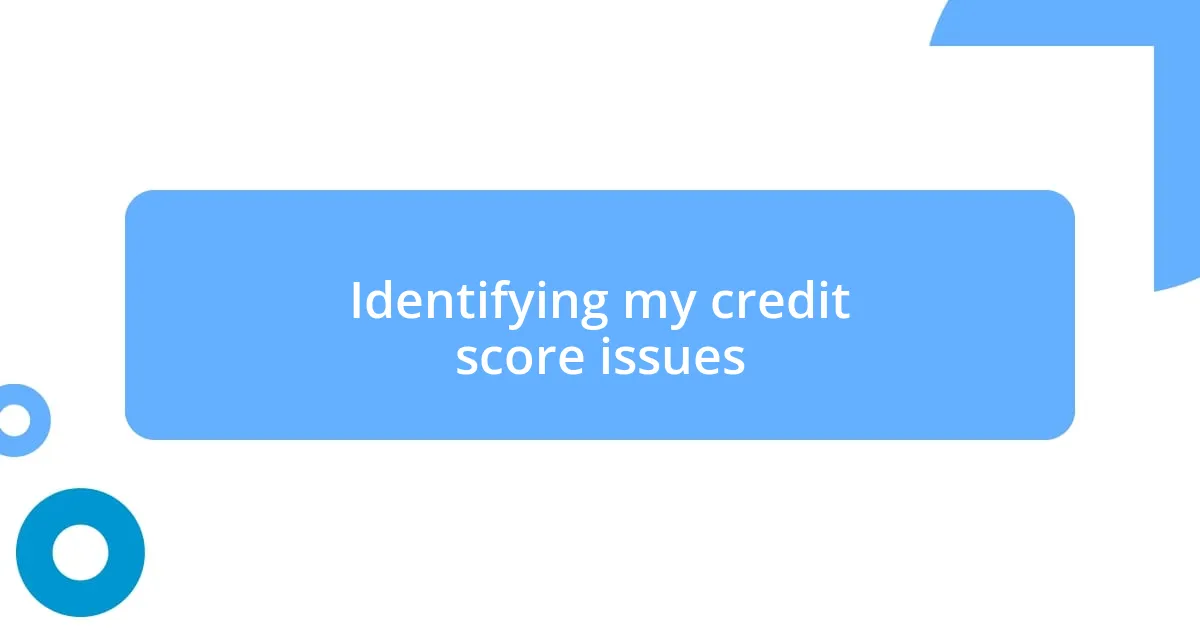
Identifying my credit score issues
Identifying my credit score issues began with pulling my credit report. I vividly recall the moment I opened it; it felt like peering into my financial soul. As I examined each section, I realized that negative marks, particularly late payments and high credit utilization, were glaring red flags that jumped out at me.
What surprised me was the sheer complexity of the score. While I knew that missed payments could hurt, I wasn’t fully aware of how much my overall debt compared to my credit limits mattered. I can remember feeling a rush of frustration—I had just thought making payments on time and having a card was enough. It was eye-opening to understand that each factor influenced my credit score differently, and I felt incredibly motivated to turn things around.
As I tracked my credit score over time, I learned to unpack each component systematically. In fact, a few months into this journey, I began keeping a spreadsheet that laid out the areas needing improvement. This proactive approach provided me with clarity, and I found myself feeling more in control of my finances than ever before. I started taking tangible steps to tackle each issue, which only fueled my determination to achieve a better score.
| Credit Score Issues | Effect on Score |
|---|---|
| Late Payments | Negative Impact |
| High Credit Utilization | Negative Impact |
| Length of Credit History | Positive Impact |
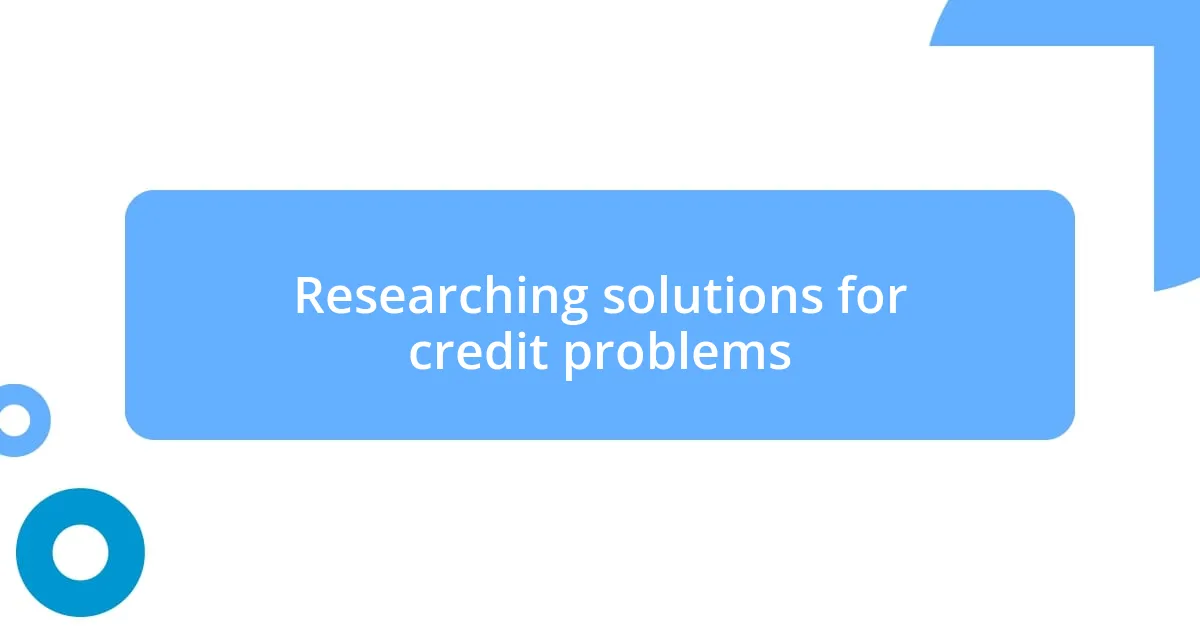
Researching solutions for credit problems
Researching solutions for credit problems turned out to be an enlightening part of my journey. I dove into a mix of online resources, books, and articles, seeking expert advice that made sense to me. The moment I stumbled upon community forums, where others shared their personal stories and triumphs, I felt a sense of camaraderie. It was comforting to know I wasn’t alone in this struggle. During my research, I found several practical strategies that resonated, such as negotiating with creditors and exploring credit counseling services, which made me realize there’s always a path forward.
Here’s a list of options I discovered that helped me tackle my credit issues:
- Create a Budget: Keeping track of my spending revealed areas where I could cut back.
- Set up Payment Reminders: I found that technology could be my ally; apps made it easy to stay on track.
- Understand Credit Repair Services: These services can offer support, but I learned to approach them with caution.
- Investigate Secured Credit Cards: I felt empowered to apply for one to rebuild my credit responsibly.
Taking the time to research these solutions gave me hope and a clearer understanding of the steps I needed to take. I remember the feeling of excitement as I jotted down ideas and strategies. Each piece of information felt like a building block towards a stronger financial future, and I couldn’t wait to implement what I had learned.
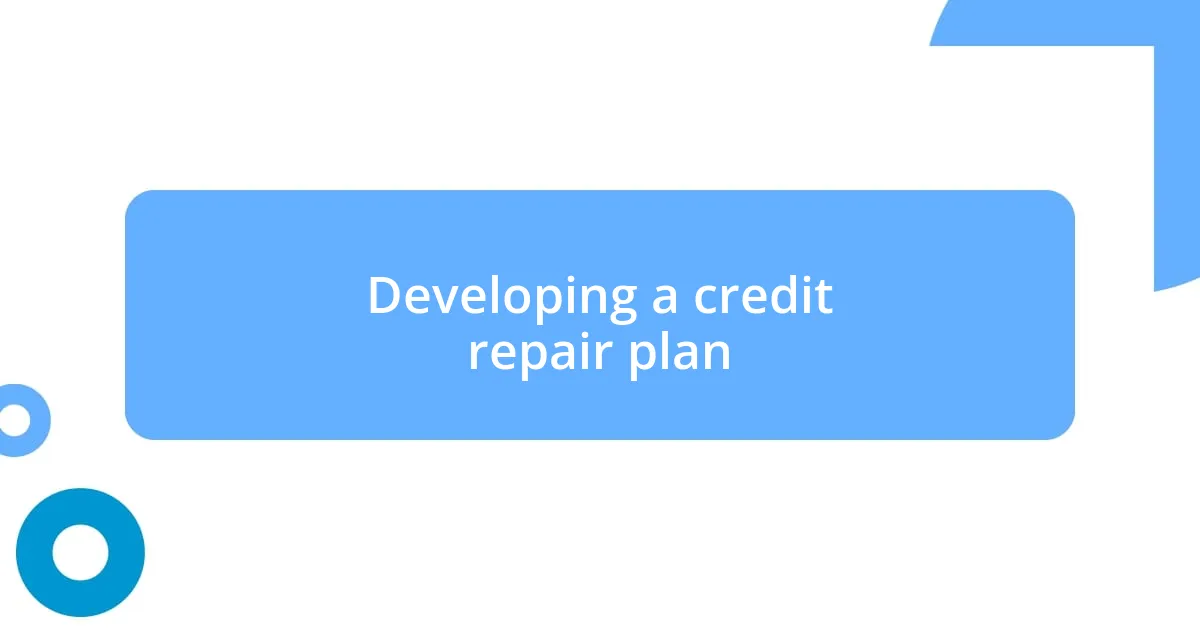
Developing a credit repair plan
Creating a structured credit repair plan was essential for me to regain control over my financial situation. I started by outlining specific, actionable steps I could take, like setting a target credit score and breaking it down into manageable milestones. How often do we overlook the power of having a clear goal? For me, visualizing my progress was crucial—I created a simple chart that tracked my improvements each month, and seeing those milestones fill felt incredibly rewarding.
Next, I prioritized my debts based on their impact on my credit score. I remember having a moment of clarity when I realized I needed to focus on the accounts with the highest balances and the most detrimental late payments first. This strategic approach not only simplified the process but also helped to alleviate my anxiety. I even found unexpected joy in making those calls to negotiate payment plans; there was something empowering about taking initiative and engaging directly with my creditors.
Lastly, I committed to regularly reviewing my credit report. Initially daunting, this practice turned into a form of self-care for me. Each month, I would sit down, cup of tea in hand, and reflect on my progress. How liberating it felt to confront my financial reality head-on! By continuously updating my plan and celebrating small victories, I turned what was once a source of stress into a journey of growth. Each step forward was a testament to my resilience and determination.
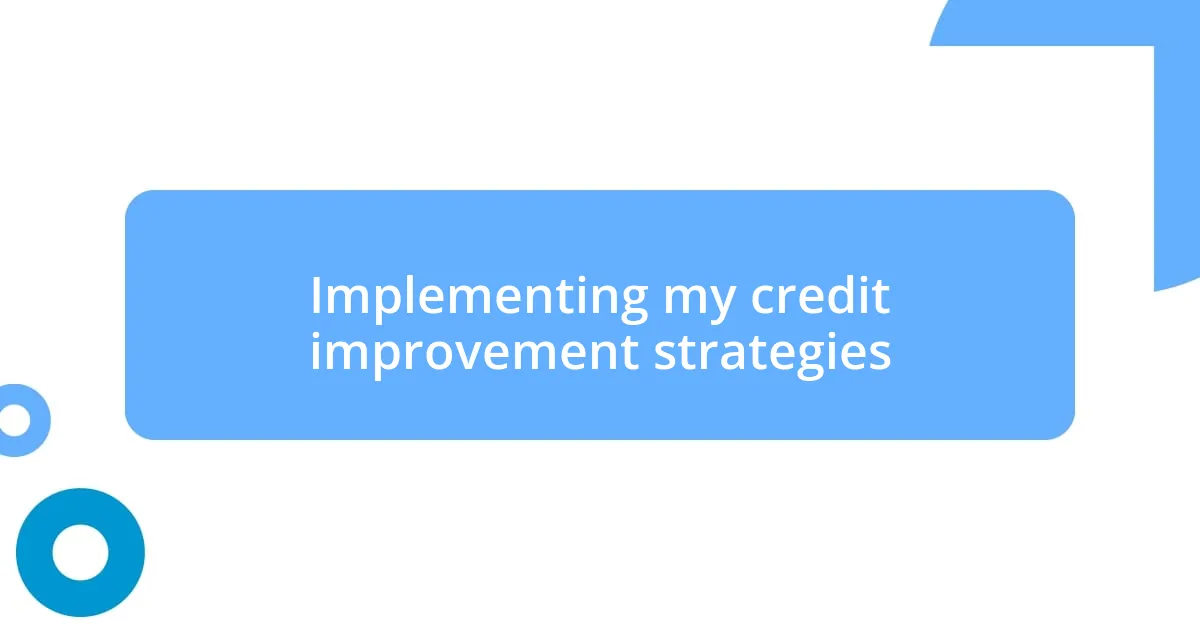
Implementing my credit improvement strategies
Implementing my credit improvement strategies was where the real transformation began. I vividly remember sitting at my kitchen table, excitedly entering my expenses into a budgeting app. At first, it felt tedious, but as I saw the numbers aligning with my goals, that tediousness turned into a thrill. Could a mere app really change my financial habits? The answer was a resounding yes; with every dollar accounted for, I felt more in control.
One of the pivotal moments was setting up payment reminders. Initially, I chuckled at the idea—was I really that forgetful? However, as my first automated payments cleared successfully, I realized how much peace of mind it brought me. The sense of urgency transformed into a secure routine, easing my anxiety and allowing me to focus on other parts of my plan. I must admit, seeing those reminders pop up felt like having a trusted friend nudging me, ensuring I stayed on track.
I also embraced using a secured credit card, which I once thought was a risky move. Remembering my hesitation, I felt nervous about the commitment, but I knew it was essential for rebuilding my credit. Each month, as I made responsible purchases and paid them off, my confidence soared. For the first time, I saw that I could be a good steward of my credit, and that realization was exhilarating. Isn’t it incredible how something as simple as a card can symbolize such progress? This journey turned into a canvas where every stroke represented growth and resilience.
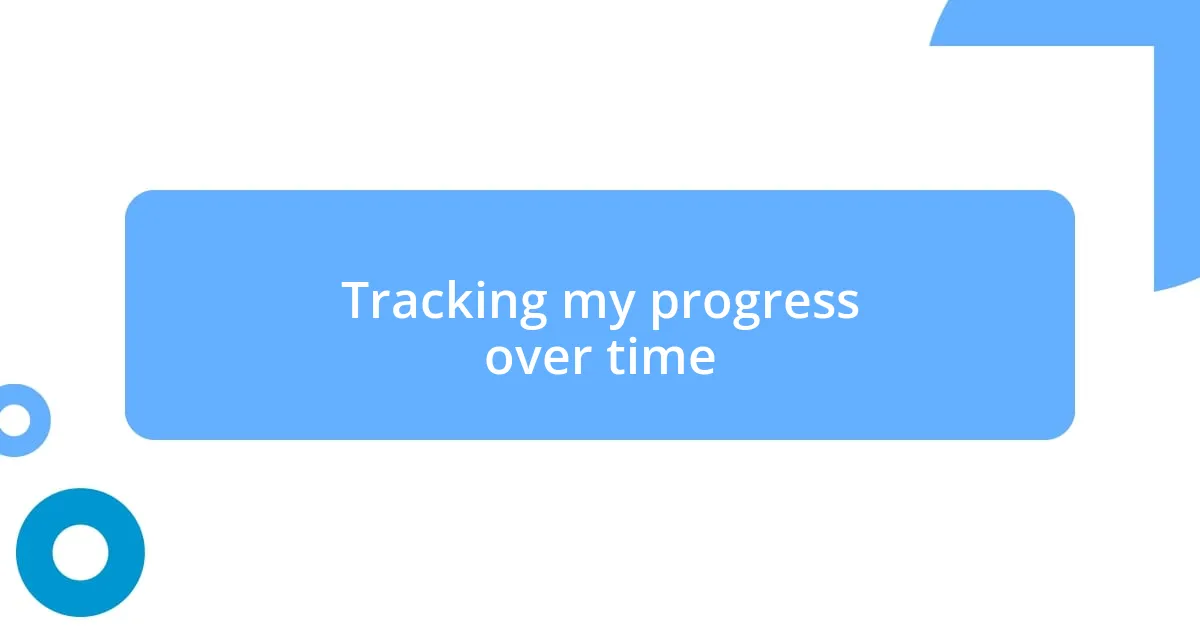
Tracking my progress over time
Tracking my progress over time became a vital part of my credit recovery strategy. I remember the sheer excitement of checking my credit score each month, feeling like I was peeking into a crystal ball that revealed my financial future. At first, my scores moved in baby steps, but those small gains sparked hope and motivated me to keep pushing forward. Have you ever experienced that kind of thrill when you see your hard work paying off? It’s genuinely stimulating.
I also took to journaling my experiences alongside my score changes. Each entry became a reflection of not just the numbers, but the emotions attached to them—like the frustration of a setback or the elation of achieving a milestone. By documenting my journey, I discovered patterns in my behavior, which clarified what strategies worked for me and what didn’t. Have you ever thought of journaling your financial journey? It can be a cathartic process that offers both clarity and insight.
One of my favorite ways to track my journey was utilizing apps designed to monitor credit scores. The gamification aspect of these applications added an element of fun. As I completed certain goals, I earned points or badges, almost like a video game. I can still recall my excitement when I finally hit that first 700 mark; it felt like winning a trophy! Engaging with my progress in such a way kept my momentum alive and reminded me that every small victory contributed to the bigger picture.
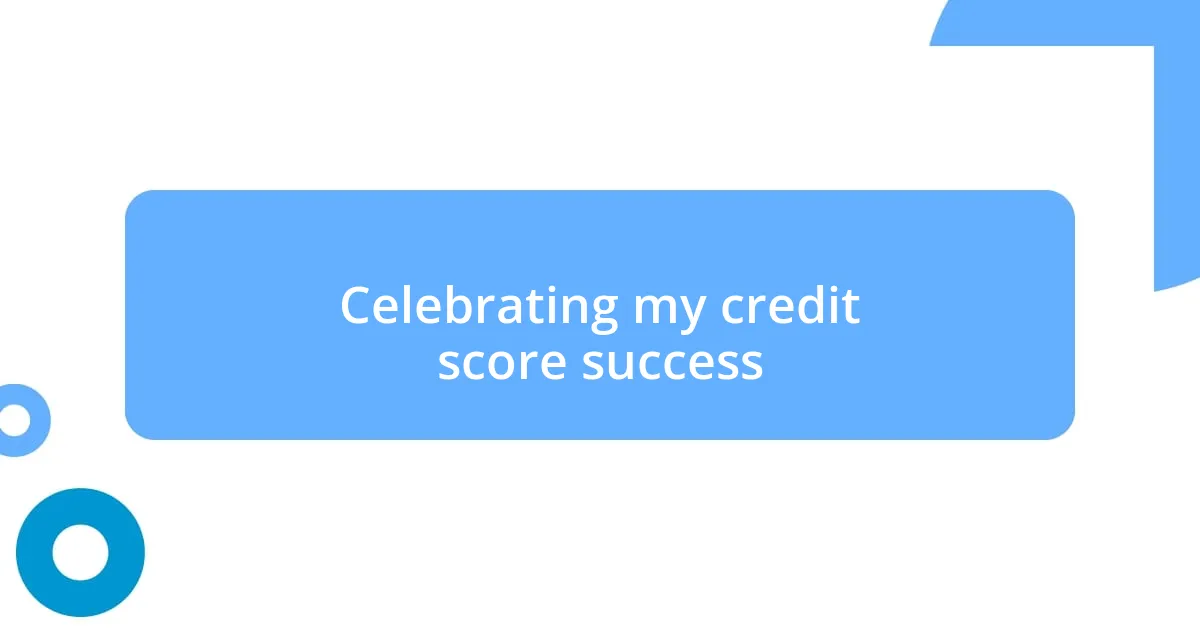
Celebrating my credit score success
Celebrating my credit score success
The day I checked my credit score and saw a solid 740, I couldn’t help but let out a joyous scream! I was alone in my living room, but it felt like I’d just scored the winning goal in a championship game. All those late nights tweaking my budget and keeping up with payments had finally paid off. It was a moment of sheer triumph that reaffirmed my dedication. Can you imagine the rush of emotions when hard work transforms into tangible success?
There’s something magical about sharing such milestones with friends and family. I decided to host a small gathering to celebrate my victory. It was like announcing a personal championship! I invited my closest friends over, and while we shared laughter and good food, I took a moment to tell them about my journey. I’ll never forget the look of genuine pride on their faces, and how their encouragement fueled my drive to maintain my credit health. Isn’t it amazing how community and support can amplify our achievements?
Not to mention the newfound sense of freedom that came with my improved score. Suddenly, I felt more empowered to explore opportunities, like applying for a better credit card and even considering that dream home. Reflecting back, the journey wasn’t just about numbers; it was about reclaiming my financial narrative. Celebrating those victories reminded me that every small step truly makes a difference. What celebrations have you marked in your life that serve as milestones?












